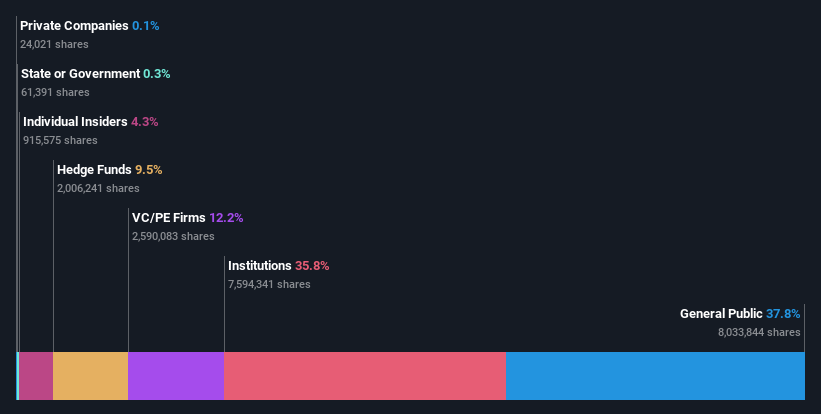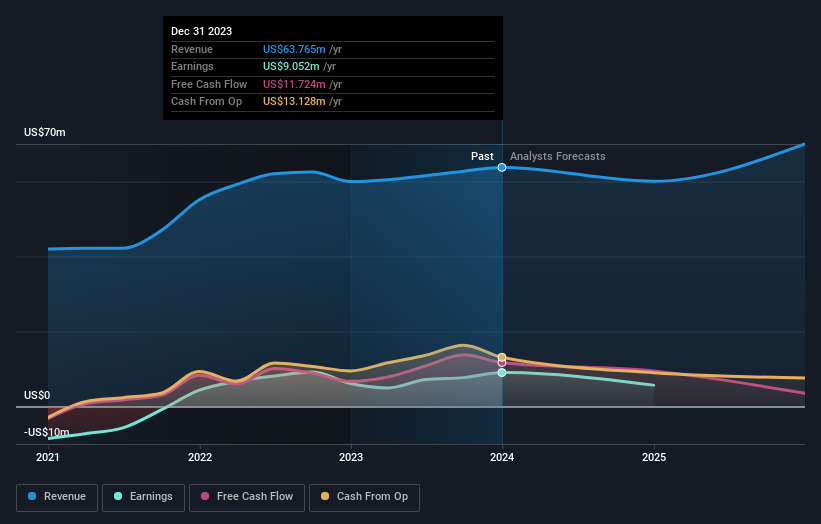While institutions own 36% of Everspin Technologies, Inc. (NASDAQ:MRAM), retail investors are its largest shareholders with 38% ownership
Key Insights
The considerable ownership by retail investors in Everspin Technologies indicates that they collectively have a greater say in management and business strategy
50% of the business is held by the top 21 shareholders
Every investor in Everspin Technologies, Inc. (NASDAQ:MRAM) should be aware of the most powerful shareholder groups. And the group that holds the biggest piece of the pie are retail investors with 38% ownership. In other words, the group stands to gain the most (or lose the most) from their investment into the company.
Institutions, on the other hand, account for 36% of the company's stockholders. Large companies usually have institutions as shareholders, and we usually see insiders owning shares in smaller companies.
Let's take a closer look to see what the different types of shareholders can tell us about Everspin Technologies.
See our latest analysis for Everspin Technologies
What Does The Institutional Ownership Tell Us About Everspin Technologies?
Many institutions measure their performance against an index that approximates the local market. So they usually pay more attention to companies that are included in major indices.
We can see that Everspin Technologies does have institutional investors; and they hold a good portion of the company's stock. This can indicate that the company has a certain degree of credibility in the investment community. However, it is best to be wary of relying on the supposed validation that comes with institutional investors. They too, get it wrong sometimes. When multiple institutions own a stock, there's always a risk that they are in a 'crowded trade'. When such a trade goes wrong, multiple parties may compete to sell stock fast. This risk is higher in a company without a history of growth. You can see Everspin Technologies' historic earnings and revenue below, but keep in mind there's always more to the story.
Our data indicates that hedge funds own 9.4% of Everspin Technologies. That's interesting, because hedge funds can be quite active and activist. Many look for medium term catalysts that will drive the share price higher. AWM Investment Company Inc is currently the largest shareholder, with 9.5% of shares outstanding. Meanwhile, the second and third largest shareholders, hold 7.1% and 5.1%, of the shares outstanding, respectively. Additionally, the company's CEO Sanjeev Aggarwal directly holds 0.7% of the total shares outstanding.
After doing some more digging, we found that the top 21 have the combined ownership of 50% in the company, suggesting that no single shareholder has significant control over the company.
Researching institutional ownership is a good way to gauge and filter a stock's expected performance. The same can be achieved by studying analyst sentiments. There is a little analyst coverage of the stock, but not much. So there is room for it to gain more coverage.
Insider Ownership Of Everspin Technologies
The definition of company insiders can be subjective and does vary between jurisdictions. Our data reflects individual insiders, capturing board members at the very least. The company management answer to the board and the latter should represent the interests of shareholders. Notably, sometimes top-level managers are on the board themselves.
I generally consider insider ownership to be a good thing. However, on some occasions it makes it more difficult for other shareholders to hold the board accountable for decisions.
Our most recent data indicates that insiders own some shares in Everspin Technologies, Inc.. In their own names, insiders own US$6.9m worth of stock in the US$162m company. It is good to see some investment by insiders, but we usually like to see higher insider holdings. It might be worth checking if those insiders have been buying.
General Public Ownership
The general public-- including retail investors -- own 38% stake in the company, and hence can't easily be ignored. This size of ownership, while considerable, may not be enough to change company policy if the decision is not in sync with other large shareholders.
Private Equity Ownership
With an ownership of 12%, private equity firms are in a position to play a role in shaping corporate strategy with a focus on value creation. Some might like this, because private equity are sometimes activists who hold management accountable. But other times, private equity is selling out, having taking the company public.
Next Steps:
I find it very interesting to look at who exactly owns a company. But to truly gain insight, we need to consider other information, too. Be aware that Everspin Technologies is showing 3 warning signs in our investment analysis , you should know about...
If you would prefer discover what analysts are predicting in terms of future growth, do not miss this free report on analyst forecasts.
NB: Figures in this article are calculated using data from the last twelve months, which refer to the 12-month period ending on the last date of the month the financial statement is dated. This may not be consistent with full year annual report figures.
Have feedback on this article? Concerned about the content? Get in touch with us directly. Alternatively, email editorial-team (at) simplywallst.com.
This article by Simply Wall St is general in nature. We provide commentary based on historical data and analyst forecasts only using an unbiased methodology and our articles are not intended to be financial advice. It does not constitute a recommendation to buy or sell any stock, and does not take account of your objectives, or your financial situation. We aim to bring you long-term focused analysis driven by fundamental data. Note that our analysis may not factor in the latest price-sensitive company announcements or qualitative material. Simply Wall St has no position in any stocks mentioned.

 Yahoo Finance
Yahoo Finance 

